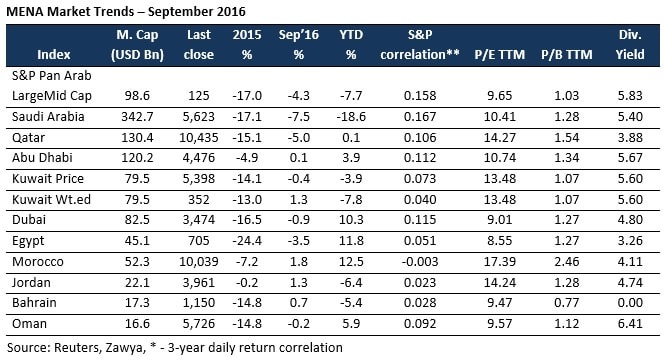
Although the oil price rose by over 4 per cent, on the back of the OPEC agreement to limit crude output, Saudi index fell considerably after the Saudi government announced that it was reducing salaries and allowances for public sector employees. Many investors believe that additional austerity steps, such as new fees or taxes on the kingdom’s large workforce of foreigners, could also be approved soon. Middle East fund managers have turned negative towards Saudi Arabian equities for the next three months because of the anticipated austerity policies.
Blue Chips also had a negative month, with Saudi Electric Company (SEC) and Ezdan Holdings (Qatar) ending the month at the bottom of the pile, losing 12.5% and 10.6%, respectively. Zain (Kuwait) and Kuwait Food Co. witnessed a gain of 4.7% and 3.3%, respectively. SEC signed a USD 1.3bn Islamic loan in September, after having already secured loans worth USD 3.8bn earlier this year. The company claims that this new loan will be used towards supporting its projects’ capital expenditure needs. The murabaha loan was supplied by three local banks: Banque Saudi Fransi, National Commercial Bank and Samba Financial Group. SEC also announced plans in August to privatize its assets by the end of the year, as part of a drive to increase efficiency in the kingdom’s utilities. A few of the large cap stocks in the Qatar index were included in the FTSE’s Russell emerging market index in August. Investors cashed in on the gains post inclusion as a few stocks’ values retreated, with Ezdan Holdings featuring among them. Anticipation of Zain’s first unified telecommunications license to operate in Saudi Arabia, led to increase in share price in the month of September.
Saudi cuts public sector wages and Oman issues bonds to overcome deficit
Saudi Arabia cut ministers’ salaries by 20 per cent, and scaled back financial perks for public sector employees in one of the most drastic measures taken by the energy-rich kingdom to save money, at a time when oil prices are sub-par. The measures, effective from October 2016, constitute the first pay cuts for government employees, who make up about two-thirds of working Saudi population. According to the announcement, housing and car allowances for members of the appointed Shoura Council will be cut by 15 per cent. Overtime bonuses are to be curbed at between 25 and 50 per cent of basic salaries, while annual leave may no longer exceed 30 days.
Oman has launched a combined USD 1.5bn tap of its June 2021 and June 2026 bonds. The five-year tranche will raise USD 500mn at 230bps over Treasuries, while the 10-year note will be for USD 1bn at plus 315bps. Oman is rated Baa1 by Moody’s and BBB- by S&P.
Oil Market Review
Brent crude rose USD 2.02 per barrel in the month of September, after the OPEC members struck a deal to limit crude output. This is the first agreement to cut production, since 2008, and the deal will be finalized at its policy meeting in November. The group reached an agreement to limit its production within a range of 32.5m-33m million barrels per day (bpd) in talks held on the sidelines of the 26-28 September International Energy Forum in Algiers. At the month end, Brent crude had risen 4.3% to close at USD 49 per barrel, which represents a YTD increase of close of 32%.
Stay Tuned To Marmore MENA Insights!
Never miss a patch or an update with Marmore's Newsletter. Subscribe now!
Related Article
Kuwait’s Approval of Public Debt Law: Re-emerging on Investors’ Radar
Kuwait has passed the long-awaited debt law in March 2025. The blog explores the importance of the law, the expected benefits and outlook for the countrys return to debt markets.
Read MoreThe Dynamic Rise of Fintech in the GCC
The convergence of technology and finance is reshaping the GCC Financial Ecosystem. The blog explores key players, regulatory framework and market dynamics of Fintech in the GCC region.
Read MoreHow secure are GCC banks compared to their global counterparts?
The blog examines the impact of cyber attacks on financial institutions and the resiliency of GCC banks compared to their global counterparts
Read More




